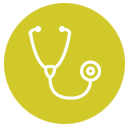


Empowering youth to develop their potential and pursue their dreams
The reality is that many children in this country are raised in poverty and in the U.S., poverty is still tied to race. Consider the fact that 33% of African-American children live below the poverty line compared to 10% of Caucasian children. Because school budgets are tied to property taxes, schools in the neighborhoods with the poorest residents get about half as much money per student as compared to their affluent counterparts.
The self-perpetuating problem of poverty is clearly demonstrated by the high school completion rates in our nation. Each year, more than one in three students fails to graduate from high school. Among minority students the numbers are even more troubling. Less than 50% of Native American and a little more than half of African American and Hispanic students complete high school on time. In some cities, the graduation rates plummet to 30% or lower overall.
At the Harris Institute/Foundation, we know that the cost to the individual and the nation will be great if this problem is not remedied. Millions will be lost in wages, taxes and productivity and incarceration rates and public assistance enrollment will rise. Individuals who do not graduate high school will earn up to $485k less over the course of their lifetimes than those who earn a diploma.
As our global world continues to expand, the US needs to ensure that our future generation is competent, particularly in the areas of math and science. Our children need to graduate high school and college and become capable citizens, ready to produce the technology of tomorrow. The Harris Institute’s educational programs seek to support the K-16 pipeline in achieving those goals by encouraging students to dream, work hard and build the character needed to achieve their goals.
The current signature initiatives of The Harris Institute/Foundation:
These educational programs aimed at making a difference in the lives of students in America. These grassroots initiatives reach into some of the most economically disadvantaged schools in the country and give students real hope for using education to move beyond their current environment.
Partnering with communities to provide optimum health and wellness
Poor health is a barrier to receiving a high quality life for individual students, their families and their communities. Current issues in health as they relate to children include:
Access(1). Families reported 3 major barriers: lack of insurance coverage, poor access to services, and unaffordable costs. Disproportionate reporting of these themes was most notable based on insurance status. A higher percentage of uninsured parents (87%) reported experiencing difficulties obtaining insurance coverage compared with 40% of those with insurance.
This issue is particularly relevant for children who live in communities of color. A recent report from the Minority Health Initiatives states that children of color are more likely to lack health coverage: There are currently 8.1 million uninsured children in the US and more than 5 million of them are children of color.
Obesity. Over the past three decades, the childhood obesity rate has more than doubled for preschool children ages 2-5 years and adolescents ages 12-19 years, and it has more than tripled for children ages 6-11 years. Children of color are more likely to be overweight than Caucasian adolescents. Obesity leads to elevated total cholesterol, triglycerides, insulin or blood pressure. The obesity-associated annual hospital costs for children and youth more than tripled over two decades, rising from $35 million in 1979-1981 to $127 million in 1997-1999.
Poor nutrition. Lack of nutritious food choices leads to many health issues including poor dental health. Poor dental health is one of the leading causes of absences for school-age children.
The current signature initiatives of The Harris Institute/Foundation:
Community Health Leaders (CHL)
In 2010, the Harris Foundation was designed the National Office of the Community Health Leaders (CHL) program. Unsung heroes are fighting these battles in local communities every day. Administered by the Harris Foundation, the Community Health Leaders Award is a national program of the Robert Wood Johnson Foundation which recognizes those individuals who are working to improve health and expand access to health care in their own communities.
For more information on the program and to see the 2010 awardees, please click here. The 2011 Call for Nominations has now been closed.
Innovative Medical Mission (IMM)
Innovative Medical Missions (IMM) is a program designed to address disparities in access to healthcare in the developing world through the use of advanced medical technologies.
The key aspects of this project are the creation of a platform for bringing advanced technology and novel treatment model for indigent care focused on managing medical missions, designed to train practitioners to coordinate medical missions and continuation of care in high-risk areas with resource-limited and nonexistent healthcare.
1. Insurance plus Access Does not Equal Health Care: Typology of Barriers to Health Care Access for Low-Income Families, Jennifer E. DeVoe, MD, DPhil; Alia Baez, BA; Heather Angier, BA; Lisa Krois, MPH; Christine Edlund, MSc; Patricia A. Carney, PhD.,Ann Fam Med. 2007;5(6):511-518.
The need for teaching students about sound financial principles and entrepreneurship is great. Financial literacy is defined as the ability to understand how money works in the world: how someone manages to earn or make it, how that person manages it, how he/she invests it (turn it into more) and how that person donates it to help others.[1] More specifically, it refers to the set of skills and knowledge that allows an individual to make informed and effective decisions with all of their financial resources.[2] We refer to it “Financial IQ”.
The President’s Advisory Council on Financial Literacy defines personal financial literacy as “the ability to use knowledge and skills to manage financial resources effectively for a lifetime of financial well-being.” (2008 Annual Report to the President)
Personal financial literacy is more than just being able to balance a checkbook, compare prices or get a job. It also includes skills like long-term vision and planning for the future, and the discipline to use those skills every day.
In the US, we make great efforts to teach children to read and write, but we don’t give their financial literacy the same attention. As a result, few young people know how to manage their personal financial lives.
The Charles Schwab 2011 Teen and Money Report showed that only one in three teens knows how to balance a checkbook and manage a credit card. Yet, 86 percent of students want to learn about money management in class before making mistakes in the real world issues.
The current signature initiatives of The Harris Institute/Foundation:
Rockit
Harris Institute/Foundation through the foundation partners with financial institutions such as Capital One Bank and the Federal Reserve Bank of Dallas – Houston Branch to launch education programs aimed at teaching students about sound financial principles and entrepreneurship.
*Giesler, Markus; Veresiu, Ela (2014). “Creating the Responsible Consumer: Moralistic Governance Regimes and Consumer Subjectivity”. Journal of Consumer Research. 41 (October): 840–857. doi:1086/677842.
“Get Smarter About Money Home – GetSmarterAboutMoney.ca”. getsmarteraboutmoney.ca.
The Harris Institute/Foundation
P.O. Box 130648
Houston, Texas 77219
Phone: 713.877.9276
Fax: 713.877.8669
info@theharrisinstitute.org
